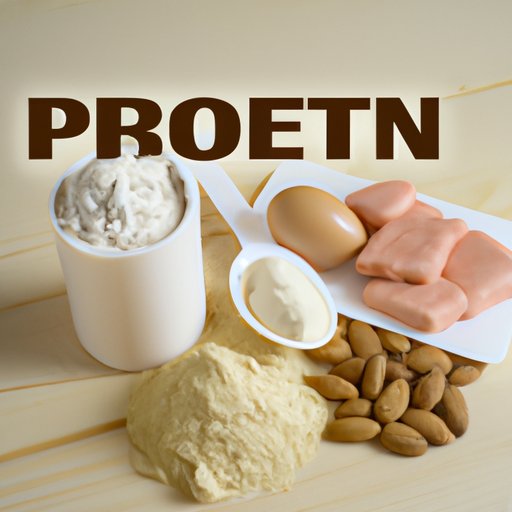Introduction
Protein plays an important role in our bodies, from providing energy to building muscle and maintaining strong bones. It’s essential for growth and development, especially during infancy and childhood. But the question remains: what percentage of your diet should be protein?
The answer depends on many factors, including age, gender, lifestyle, and activity level. To get the most out of your diet, it’s important to understand the benefits of protein and how much you need to consume on a daily basis.

Analyzing the Benefits of Eating Protein and How Much You Should Consume
Protein is an important macronutrient that our bodies use to build, repair, and maintain tissues. It also helps to regulate hormones, enzymes, and other body processes. Protein can be found in both animal and plant sources, such as lean meats, dairy products, eggs, legumes, and nuts.
The recommended daily intake of protein varies by age and gender. The general recommendation for adults is 0.8 grams of protein per kilogram (2.2 pounds) of body weight each day. For children and adolescents, the recommendation is 1.05 grams per kilogram of body weight.
When it comes to the best sources of protein, lean meats, fish, poultry, eggs, and dairy products are all great choices. Plant-based proteins such as legumes, nuts, and seeds are also excellent sources of protein. It’s important to note that some plant-based proteins are considered “incomplete” because they don’t contain all the essential amino acids. Therefore, it’s important to combine different types of plant-based proteins to ensure you’re getting a complete source of protein.
To ensure you’re getting enough protein, it’s important to create a balanced meal plan. This means including a variety of foods with the right amounts of protein, carbohydrates, and fats. Aim to include at least one serving of protein in each meal and snack. A serving size is typically equivalent to 3 ounces (85 grams) of meat or two eggs.
Understanding the Role of Protein in Weight Loss and Maintenance
In addition to providing essential nutrients, protein also plays an important role in weight management. Studies have shown that high-protein diets can help reduce appetite and increase feelings of fullness. This makes it easier to stick to a consistent calorie deficit and maintain a healthy weight.
It’s important to note that a high-protein diet isn’t necessarily better than a low-carbohydrate diet. In fact, studies have shown that a combination of both can be beneficial for weight loss and maintenance. While a high-protein diet may help you feel fuller, a low-carbohydrate diet can also help reduce cravings and improve blood sugar control.
The key is to find the right balance between protein, carbohydrates, and fats that works best for you. Eating a variety of nutrient-dense foods will help ensure you’re getting all the essential nutrients your body needs.
Conclusion
Protein is an essential macronutrient that plays an important role in our bodies. Eating a balanced diet with the right amount of protein is essential for overall health and well-being. However, the amount of protein you need to consume on a daily basis depends on many factors, including age, gender, lifestyle, and activity level.
When it comes to the best sources of protein, lean meats, fish, poultry, eggs, and dairy products are all great choices. Plant-based proteins such as legumes, nuts, and seeds are also excellent sources of protein. Additionally, protein can help with weight management, as it can help reduce appetite and increase feelings of fullness.
To get the most out of your diet, it’s important to understand the benefits of protein and how much you need to consume on a daily basis. Eating a variety of nutrient-dense foods will help ensure you’re getting all the essential nutrients your body needs.
Resources
For more information on protein and its role in a healthy diet, check out the following resources:
- Harvard T.H. Chan School of Public Health: What Should You Eat? Protein
- Mayo Clinic: High-Protein Diet: Benefits, Risks, and Foods
- Harvard Health Publishing: How Much Protein Do You Need Every Day?
- Academy of Nutrition and Dietetics: How Much Protein Do You Need?
(Note: Is this article not meeting your expectations? Do you have knowledge or insights to share? Unlock new opportunities and expand your reach by joining our authors team. Click Registration to join us and share your expertise with our readers.)
